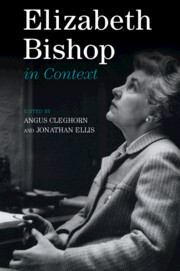Book contents
- Elizabeth Bishop in Context
- Elizabeth Bishop in Context
- Copyright page
- Contents
- Figure
- Contributors
- Acknowledgements
- Note on Referencing and Abbreviations
- Chronology
- Introduction
- Part I Places
- Part II Forms
- Part III Literary Contexts
- Part IV Politics, Society and Culture
- Chapter 18 War
- Chapter 19 The Cold War
- Chapter 20 Music
- Chapter 21 Psychoanalysis
- Chapter 22 Religion
- Chapter 23 Anthropology
- Chapter 24 Travel
- Part V Identity
- Part VI Reception and Criticism
- Works Cited
- Index
Chapter 22 - Religion
from Part IV - Politics, Society and Culture
Published online by Cambridge University Press: 06 August 2021
- Elizabeth Bishop in Context
- Elizabeth Bishop in Context
- Copyright page
- Contents
- Figure
- Contributors
- Acknowledgements
- Note on Referencing and Abbreviations
- Chronology
- Introduction
- Part I Places
- Part II Forms
- Part III Literary Contexts
- Part IV Politics, Society and Culture
- Chapter 18 War
- Chapter 19 The Cold War
- Chapter 20 Music
- Chapter 21 Psychoanalysis
- Chapter 22 Religion
- Chapter 23 Anthropology
- Chapter 24 Travel
- Part V Identity
- Part VI Reception and Criticism
- Works Cited
- Index
Summary
This essay ponders Elizabeth Bishop’s complex relationship to Christianity. Though she was often called an unbeliever, she loved the work of George Herbert, Gerard Manley Hopkins, Simone Weil, and St. Teresa. She once wrote in her journal that “genuine religious poetry seems about as far as poetry can go – and as good as it can be.” Yet she was also prone to mock religiosity. Her poem “The Unbeliever” lends itself to being misread as a statement of her own position. In fact, however, she was neither a believer nor a confirmed non-believer. She once described her position to Robert Lowell as one of sitting on the fence. Her discomfort with those who were too emphatic about their religious beliefs probably derived from the traumas she experienced as a child. Though rarely examined by critics, “A Cold Spring” is an excellent example of her refusal to find in the natural world the sort of “message” that Hopkins often found there.
- Type
- Chapter
- Information
- Elizabeth Bishop in Context , pp. 256 - 265Publisher: Cambridge University PressPrint publication year: 2021

